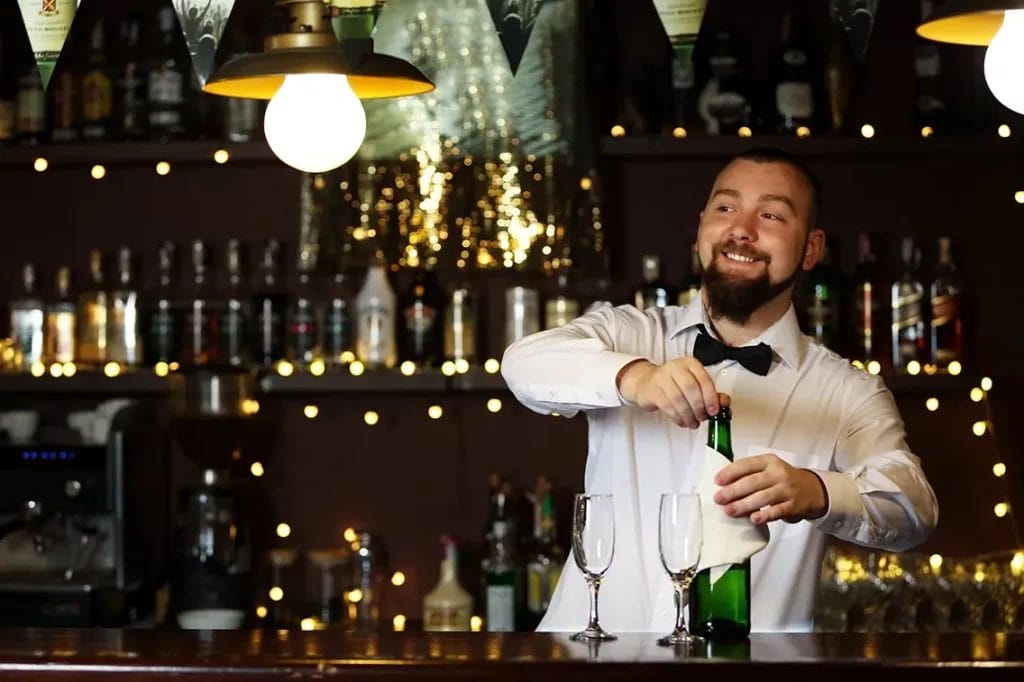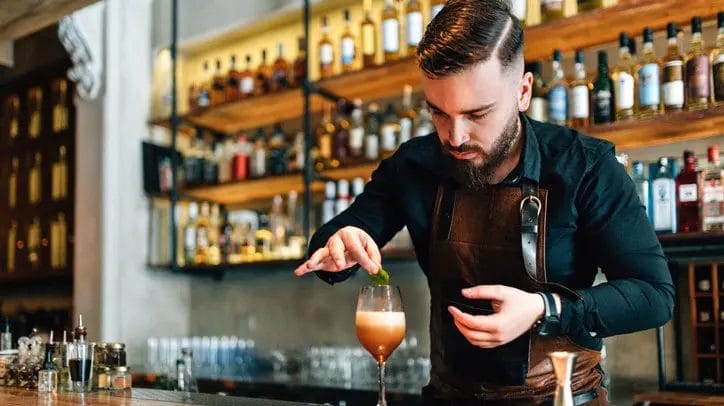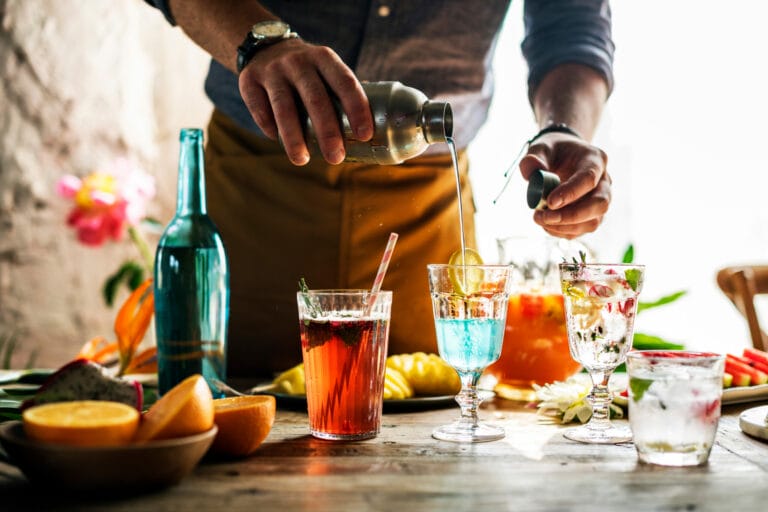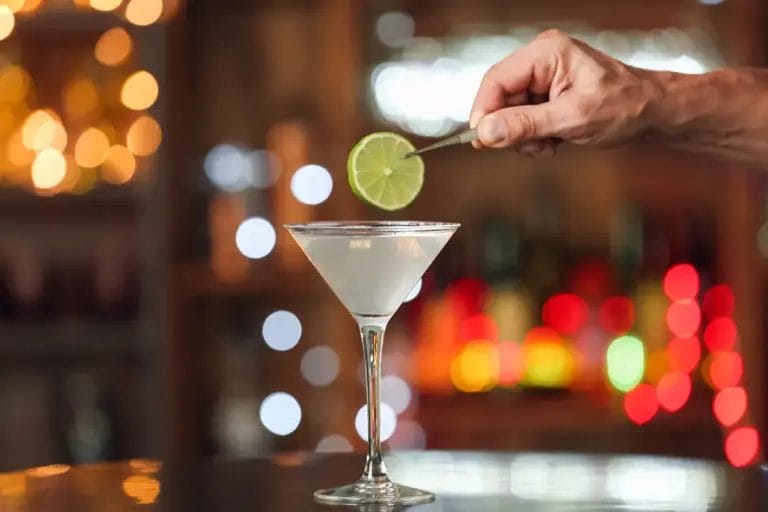Last Updated: 5/24/2024
With a consistent year-over-year growth projected through 2032, bartending is a stable and lucrative industry. For many people, owning an event bartending business is a dream job.
And why not? If mixing and serving drinks is your passion, there’s plenty of opportunity to turn it into a profitable career.
If you’re wondering how to start an event bartending business, we’re here to help. From gaining industry experience to getting your business registered, licensed, and insured, we’ve got your back.
Pull up a barstool and let us serve up a rundown on how to become an event bartender.
1. Industry Experience
Bartending is one of those jobs that values experience over a formal education.
That doesn’t mean it’s an easy gig, though. Being a quality bartender involves building up a wealth of knowledge and on-the-job training.
Before you start slinging drinks and mixing cocktails, you can build up some industry cred by learning the ropes.
Here are a few ways to get some experience before putting your bartender business plan into action.
Work in the Restaurant Biz
When you work in a restaurant, you can learn about the service industry and whether that lifestyle fits your style.
Much like bartending, serving tables can involve late hours and lots of customer interaction. Plus, most restaurant bars are less busy than lounges or nightclubs, making it easier to learn new skills.
You could even get some free training by working in a restaurant. If you serve alcohol, you’ll have to complete an alcohol safety course, like TIPS or ServSafe, which gives you important foundational knowledge.
Many restaurants also promote from within, so you might be able to earn a bartending position after getting some on-the-job training.
Get Your Foot in the Door as a Barback
A barback serves a vital role in keeping a bar operating smoothly. They replenish ingredients, polish glasses, restock beer and liquor, and often assist customers.
Essentially, a barback is an assistant for the bartender who needs to know the ins and outs of running a bar.
Many bartenders get their start as barbacks by shadowing and getting on-the-job training. You can absorb the culture, business operations, and skills necessary for bartending.
Working as a barback helps you learn bartending jargon, how to mix drinks, and which glassware and garnishes to use.
Go to Bartending School
While a formal bartending education isn’t required, it can give you a deeper understanding of technique, job functions, common drink recipes, and how to serve responsibly.
Bartending schools provide core training that you will use throughout your bartending career.
You have two options when it comes to bartending school: in-person or online.
On-site training can be pricey and you’ll need to make the time to attend classes, but you do get practical experience.
On the other hand, online courses are more cost-effective and easier to schedule, but you won’t get hands-on practice.

2. Business Name, Registration and Licensing
Once you have the experience to start your own event bartending business, it’s time to make it official. You’ll need to choose a name, register your business, and get the proper licensing for your area.
Choose a Name
This is the fun part! You’re about to embark on a new journey as a business owner, so it’s important to start on the right foot with a great name.
Choosing the right name for your bartending business comes down to understanding who you are, what you want your business to be, and how you want customers to perceive you.
If you’re at a loss, the internet is a great place for ideas. Try using generative AI, like ChatGPT, to help you brainstorm potential names. You can also try name-generating sites designed specifically to create catchy, attention-grabbing business names.
If you want to trademark your business, brand, or any specialty products you may have, you can do that with the U.S. Patent and Trademark Office.
Register Your Business
Once you have your name, you’ll need to decide on a business structure. The best business structure for a mobile bartender depends on a few factors, like how much you make and whether or not you work with a partner or employees.
It’s fairly easy to register your business once you have the details worked out. Local laws vary, but you can typically register your business online.
It’s especially important for traveling event bartenders to research the requirements for everywhere you may operate since every state is different.
Get Your Licenses
Depending on your state laws, you may be required to get bartending and liquor licenses when starting your business.
Every state is a little different, so you’ll need to do some research to learn what you need. You can learn more by checking out your state’s department of alcoholic beverage control.
It’s important to note that some states, like California, will not provide bartenders with liquor licenses, only businesses and organizations. This means you will not be authorized by the state to sell alcohol. You can still serve it, but the event organizers must provide the liquor, beer, and wine.

3. Bartender Insurance
Now that you’ve made things official, you’re almost ready to start booking bartending gigs. But first, you need to cover your business with bartender insurance.
Thanks to your training and experience, you know that serving alcohol comes with some unique risks. Liquor liability coverage is the best way to protect yourself.
Dram shop laws vary from state to state. More often than not, bartenders can be held liable for the actions of an intoxicated customer, particularly if they were overserved or a minor. You could be stuck with massive medical bills, legal fees, and property damage costs without dram shop insurance.
If your bartending career has been smooth sailing so far, it’s easy to think you don’t need insurance, but consider these real-life examples of what can go wrong:
- A couple of wedding guests get into a fistfight after you’ve been serving them shots all evening. Both require medical attention, plus they broke one of the venue’s tables.
- At a corporate networking event, you accidentally serve an underaged guest. She ends up causing a car accident on the way home.
- Security has to remove a belligerent (and intoxicated) guest from a company holiday party. He hits his head while fighting the officer and ends up with a severe concussion.
In all of these examples, you could be held financially responsible, but bartending insurance could mitigate or even eliminate your out-of-pocket costs.
It’s also important to note that events and venues will require you to carry insuranceBe before you can work for them. Being proactive and having coverage ahead of time shows that you are a responsible and trustworthy business owner.
Speaking of liability protection, you should also purchase bartender insurance before starting your own event bartending business.
Bartender insurance is an insurance plan designed to protect bartenders from the risks associated with their business.
For example, did you know that, according to some state’s dram shop laws, if one of your patrons caused or got involved in an accident you could be legally held liable to pay for it?
Depending on the severity of the accident, liquor-related claims can cost hundreds of thousands—sometimes even millions of dollars—to resolve.
Such a claim could financially ruin your new bartending business before it even gets started. That’s why you need to protect your business with bartender insurance, which can reduce and even remove the out-of-pocket costs your business may be required to pay for alcohol-related accidents caused by your patrons.
5. Bartending Equipment and Ingredients
Tending bar is a craft, and every craft requires the right tools.
As an event bartender, you’ll need to have a kit that includes your essential equipment. Some venues may have everything you need, while others might expect you to bring all of the necessities yourself.
Some of the supplies you may need include:
- Drink glasses
- Jigger
- Citrus press
- Wine opener
- Spirit pourers
- Bar spoon
- Muddler
- Shaker
- Cocktail strainer
- Knife
In addition to supplies, you may or may not need to bring your own ingredients. Some states only allow the company, organization, or venue to supply the alcohol, so familiarize yourself with local laws.
If you need special ingredients, such as garnishes or juices, you should include those in your kit regardless.

Booking Your First Event Bartending Gigs
Industry experience? ✅
Business registered and licensed? ✅
An awesome menu? ✅
Supplies? ✅
It looks like you’re all set to start booking gigs and showing off your skills!
It’s time to start marketing your business through networking, social media, and even ads if it’s in your budget.
You’ll also need to nail down your prices. For example, your fees for bartending a wedding may differ from those for serving a corporate gala.
The best part? It’s all up to you! Learning how to start an event bartending business means you get to work when, where, and how you want. So start filling up your calendar and serving up drinks on your terms.
FAQs About Event Bartending
Can You Make a Lot of Money as a Bartender?
You can make good money bartending, especially as you gain experience. Event bartenders charge anywhere from $20 to $60 per hour and patrons usually tip an additional 15–20% per drink.
According to GlassDoor, you could earn between $52,000 and $93,000 per year, depending on how many events you work.
How Do I Set My Pricing?
To calculate your drink prices, you need to figure out the liquor cost and your target pour cost. First, calculate the liquor cost by dividing the price of the full bottle by the number of ounces in it:
Bottle Price / Ounces in the Bottle = Liquor Cost per Ounce
Second, determine the beverage or pour cost. Most bartenders aim for a pour cost of 18-25%. Once you have this figure, you can calculate the drink price by dividing the liquor cost by the pour cost:
Liquor Cost / Pour Cost (in Decimals) = Drink Price
From there, you can round up to the nearest dollar for clearer pricing.
What Should I Include in My Service Contract?
Your service contract is a legally binding document, so it’s essential to consider every detail of your business. Some key points to include:
- Contact information for all parties
- Date
- What services will be rendered
- Whether supplies are part of your rate or charged separately
- Your rate (hourly or per event)
- Event details (date, time, location, etc.)
- Special requests
- Terms of payment
- Licensing, insurance, and permit information
- Photo or video release
- Tipping policy
If you’re not sure where to start, consider hiring an attorney to write up a contract, or try online services that can provide templates.
How Do I Market My Event Bartending Business?
There are many ways to market your bartending business, many of which are free or inexpensive.
To start, build your social media presence and post in local groups for visibility in your community. Print business cards and hand them out at every opportunity. Finally, word of mouth from satisfied customers is one of the best ways to build your client base.
How Can I Scale My Business?
To scale your bartending business, you can first target more upscale events as these tend to pay more and boost your reputation.
You’ll also need to revise your business plan to fit your more ambitious goals. Eventually, you’ll also need to hire bartenders—more events means you can’t serve all of them yourself.





